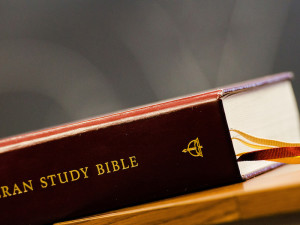by Rev. Paul Doellinger
In his lectures on Genesis, Luther marvelously describes the nature of faith and believing. Abraham was justified by faith (Rom. 4:1-6). He believed the extraordinary promises of the Lord and the Lord counted it to him as righteousness (Gen. 15:6). The same is true for you. You are justified by faith alone. Your faith and believing is the same as Abraham’s, for the object of faith is Christ and His Word.
Read Genesis 17:15-27.
- Commenting on verse 17, Luther describes the faith of Abraham: “To me indeed it seems that Christ had this very passage in mind when He said (John 8:56): ‘Abraham saw My day and was glad.’ … Exulting and triumphing in the most beautiful and perfect faith, he falls to the ground and laughs. Full of wonderment, he says, ‘Shall a son be born to me, a man of one hundred years old, and from Sarah at that?’ …He forgets his own dead body, even about corpselike Sarah, and sees with certainty that an heir is to be born to him from Sarah. Therefore he laughs and rejoices, and later on, as a result of this very laughter and this spiritual and inexpressible joy, a name is given to the son, and he is called Isaac for an everlasting remembrance and an eternal monument of faith so glorious, steadfast, and sure that when these words had hardly been uttered by the Lord, the saintly man is filled with such great joy… For he is sure that he will be the father and Sarah will be the mother of Jesus Christ, the Son of God, through whom salvation and blessing will come to the entire world.”[1] What are some of the extraordinary promises that God has given to you, the Christian?
2. Prayer is the voice of faith, for it is grounded in the Word and promise of God. “One may observe that God always grants more than we are able to ask or understand…Our narrowly defined petitions and our desires and vows are something finite and are exceedingly petty in comparison with that boundless and immeasurable return which God constantly wants to put in practice toward us…Thus we are weak, and our heart does not understand the boundless mercy of God…We are frightened from [all] sides, by the immensity of the evils that confront us and by the magnitude of the future which we seek to obtain…Such are truly the sentiments of all human beings. Yet we must learn that we should pray even in the most desperate evils and hope for the unexpected and impossible. And it is for this reason that these examples of the holy patriarchs are set before us. They show us that the patriarchs, too, were afflicted by sundry cares and trials and yet received more good than they either understood or had been bold enough to ask for…if we want to describe our prayers, they are really nothing else than the stammering of children who ask for bread or a morsel before meals. For we do not know what we should ask for. The things we ask for are beyond comprehension, and He who bestows them is greater; and the things are also too great for our narrow hearts to understand.” [2] Consider the Lord’s Prayer. What promises of God are the basis for each petition?
3. Abraham and the patriarchs are given as an example of faith and suffering. In the weakness of our flesh and sin, the Lord strengthens us. “Even though God does not appear to us in an extraordinary form, as He did to Abraham, yet His usual and most friendly and most intimate appearance is this, that He presents Himself to us in the Word, in the use of the Keys, in Baptism, and in the Lord’s Supper…If Abraham had seen the kindness God shows by speaking and associating with us through the daily ministry in Baptism and in the Lord’s Supper, he would have died from wonderment and joy…It is true that you hear a human being when you are baptized and when you partake of the Holy Supper. But the Word which you hear is not that of a human being; it is the Word of the living God. It is He who baptizes you; it is He who absolves you from sins; and it is He who commands you to hope in His mercy…Actually our glory in the New Testament is greater. We not only have God drawing near to us; we also have Him dwelling in us bodily. But if His Person is not manifest in such a way that we see Him face to face, yet His Word and works are manifest.”[3] Why is it so important for the Christian to have a church and a pastor?
4. Abraham obeyed the command of the Lord, even when it may have seemed strange and burdensome. “Let us, too, have the same way of thinking, so that we may obey God’s commands without any argument. In this manner we shall make our calling sure. Inactivity or arguments and speculations do not make it sure; they cause us to lose it entirely…Let us crucify this baneful why, and let us say: ‘Glory to God, who alone is wise, but confusion to us!’ Satan opened our eyes in Paradise, and now our every effort is directed toward closing them again and making them blind. The fact that Adam had his eyes opened is the occasion and cause of death and damnation for all his descendants…For God’s judgments are beyond our comprehension. Reason cannot grasp them. Therefore if it argues about them, it not only deceived itself but also falls into blasphemy. Accordingly let it be enough for us to hear the Word and understand what it commands, even though we do not understand the reason for the command…Let us, too learn, to put aside all questions and simply to go in the name of the Lord and do whatever God has commanded, whether it is foolish, offensive, or dangerous. If God’s command is connected with it, even a work that is disgraceful and shameful in the sight of reason is most beautiful and holy; for there is no greater and better adornment than the Word of God. Inasmuch as circumcision had this adornment, it was a holy work and was most pleasing to God.” [4] Consider the Ten Commandments. How should a Christian view the ordinary commands of the Lord for his or her daily life?
Like Abraham, the Lord has made some extraordinary promises to you. Your sins are forgiven. You will be raised from the dead and given eternal life in God’s kingdom that has no end. You have been rescued from sin, death, and hell because Christ has died and Christ has risen. The Gospel preached to you declares it. The water and Word of your Baptism guarantees it. Believing and trusting in these promises of God is thus counted to you as righteousness. As St. Paul says, “So then, those who are of faith are blessed along with Abraham, the man of faith” (Gal. 3:9). May the Lord grant us steadfastness and faith like Abraham so that we believe and trust in His promises!
The Rev. Paul Doellinger is pastor of St. Paul Lutheran Church, Cassopolis, Mich.
[1] Luther, M. (1961). Vol. 3: Luther’s Works, vol. 3: Lectures on Genesis: Chapters 15-20 (J. Pelikan,
Ed.). Saint Louis: Concordia Publishing House., pg. 154
[2] Ibid., pgs. 157-159
[3] Ibid., pgs. 165-169
[4] Ibid., pgs. 174-175

